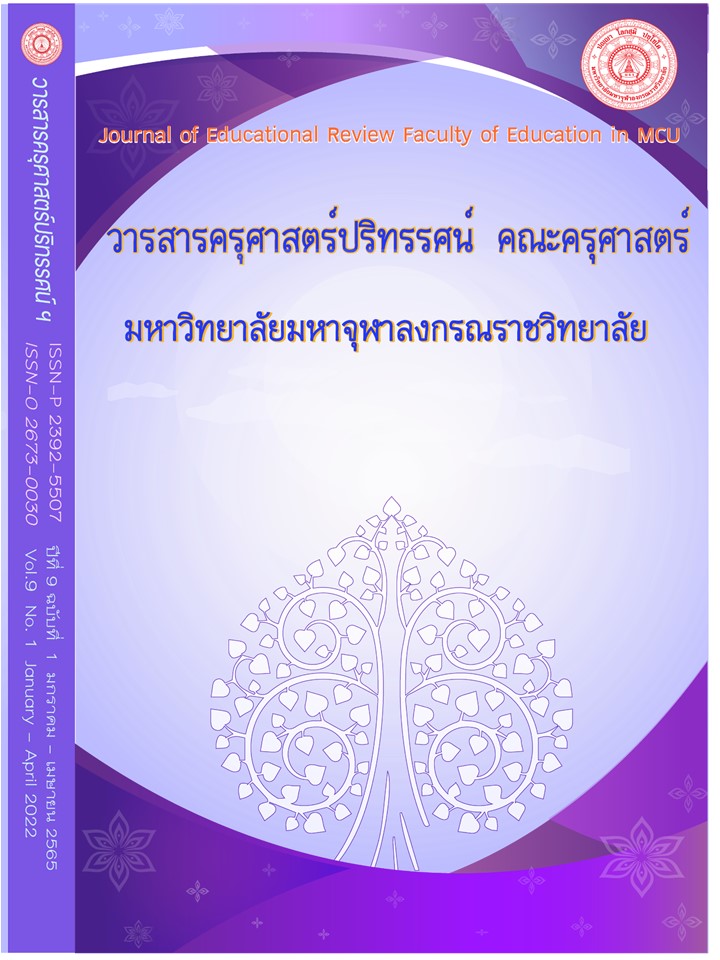A STUDY THE STATE AND PROBLEMS IN KNOWLEDGE MANAGEMENT BASED ON BUDDHADHAMMA IN SCHOOLS UNDER THE OFFICE OF BANGKOK SECONDARY EDUCATIONAL SERVICE AREA 1
Main Article Content
Abstract
This research article aims to study the condition and problems of knowledge management according to Buddhist principles in educational institutions under the office of Bangkok Secondary Educational Service Area 1. The research method consisted of a sample group of administrators and secondary school teachers under the Office of Secondary Education Service Area. Sample size was set from Krejcie & Morgan's tables, and a sample of 400 people was obtained. The research instruments were questionnaires, and the data was analyzed using percentage, mean and standard deviation. The results showed that the condition of knowledge management according to Buddhist principles in educational institutions under the office of Bangkok Secondary Educational Service Area 1, at a high level both overall and in each aspect in all 5 areas, namely the formulation of knowledge, knowledge inquiry, knowledge sharing, knowledge storage, and learning. Knowledge management problems according to Buddhist principles are lack of knowledge transfer and are stored in various places scattered, not bringing knowledge to create competitiveness, there is no systematic accumulation of existing knowledge, not applying external knowledge, and knowledge in educational institutions.
Article Details

This work is licensed under a Creative Commons Attribution-NonCommercial-NoDerivatives 4.0 International License.
ทัศนะและความคิดเห็นที่ปรากฏในบทความในวารสารฉบับนี้ถือเป็นความรับผิดชอบของผู้เขียนบทความนั้นเพียงผู้เดียว และไม่ถือเป็นทัศนะและความรับผิดชอบของกองบรรณาธิการ
กองบรรณาธิการขอสงวนสิทธิ์ในการคัดเลือกบทความลงตีพิมพ์และจะแจ้งให้เจ้าของบทความทราบหลังจากผู้ประเมินบทความตรวจอ่านบทความแล้ว
ต้นฉบับที่ได้รับการตีพิมพ์ในวารสารครุศาสตร์ปริทรรศน์ คณะครุศาสตร์ มหาวิทยาลัยมหาจุฬาลงกรณราชวิทยาลัย ถือเป็นกรรมสิทธิ์ของคณะครุศาสตร์ มหาวิทยาลัยมหาจุฬาลงกรณราชวิทยาลัย ห้ามนำข้อความทั้งหมดหรือบางส่วนไปพิมพ์ซ้ำ เว้นเสียแต่ว่าจะได้รับอนุญาตจากมหาวิทยาลัยฯ เป็นลายลักษณ์อักษร
References
ฉลองรัฐ อินทรีย์. (2550). การพัฒนารูปแบบการจัดการความรู้คณะพยาบาลศาสตร์มหาวิทยาลัยราชธานี. ดุษฎีนิพนธ์การศึกษาดุษฎีบัณฑิต. มหาวิทยาลัยมหาสารคาม.
ชวลิต ขอดศิริ. (2549). การจัดการความรู้ของโรงเรียนมงฟอร์ตวิทยาลัย แผนกมัธยมศึกษา จังหวัดเชียงใหม่. วิทยานิพนธ์ศึกษาศาสตรมหาบัณฑิต. มหาวิทยาลัยเชียงใหม่.
บุญชม ศรีสะอาด. (2535). การวิจัยเบื้องต้น. พิมพ์ครั้งที่ 5. กรุงเทพมหานคร: ชมรมเด็ก.
ไพโรจน์ ชลารักษ์. (2551). การจัดการความรู้: สังกัปทางทฤษฎี. นครปฐม: เพชรเกษมพริ้นติ้งกรุ๊ป.
ภราดร จินดาวงศ์, (2550). การจัดการความรู้ Knowledge Management The Experience. กรุงเทพมหานคร: ซีดับบลิวซีพริ้นติ้ง.
รับขวัญ ภาคภูมิ. (2547). ความสัมพันธ์ระหว่างการบริหารงานตามหลักธรรมาภิบาลของผู้บริหารสถานศึกษากับสุขภาพองค์กรของสถานศึกษา สังกัดสำนักงานพื้นที่การศึกษากําแพงเพชร เขต 1. วิทยานิพนธ์ครุศาสตรมหาบัณฑิต. มหาวิทยาลัยราชภัฎกําแพงเพชร.
สถาบันวิจัยและพัฒนา มหาวิทยาลัยศิลปากร. (2550). การจัดการความรู้. นครปฐม: มหาวิทยาลัยศิลปากร.
Carla O’Dell and others. (1998). If Only We Knew What We Know: The Transfer of Internal Knowledge and Best Practice. The Free Press. n.p..
Inkpen, (1996). Creating Knowledge through collaboration, California Management Review. New York: Authur P. Brief.
Likert, Rensis. (1967). The Method of Constructing and Attitude Scale. in Reading in Attitude Theory and Measurement. Fishbeic Matin Ed. New York: Wiley & Son.


